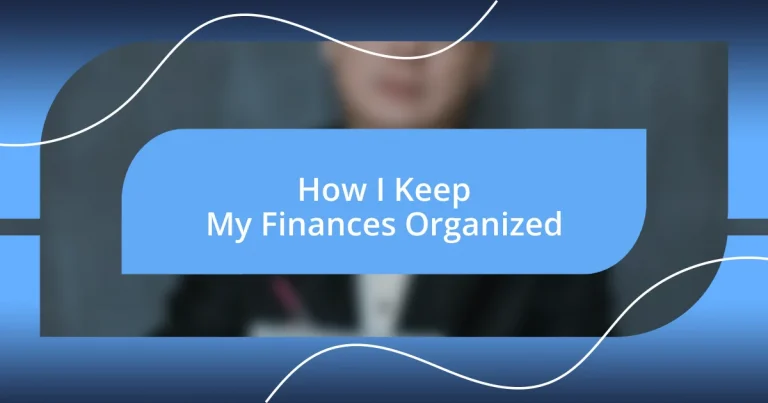Key takeaways:
- Categorizing expenses and regularly reviewing finances leads to greater clarity and control over spending habits.
- Setting clear, flexible financial goals using the SMART criteria helps create a structured plan to achieve short-term and long-term aspirations.
- Building an emergency fund through automated savings enhances financial security and peace of mind during unexpected events.
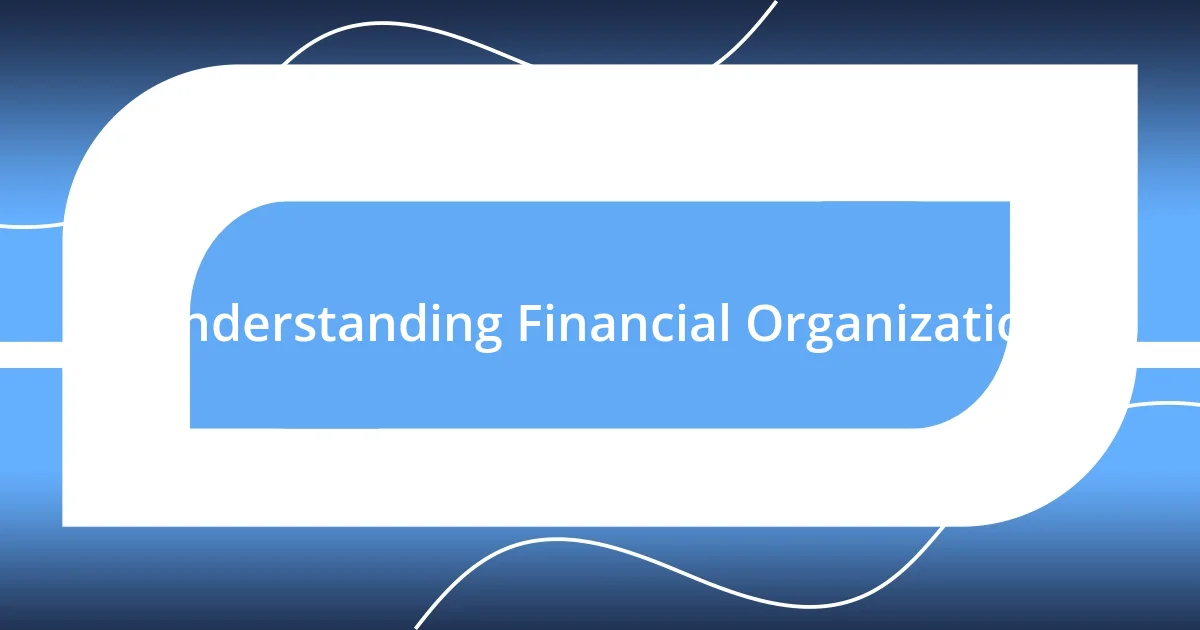
Understanding Financial Organization
Financial organization isn’t just about numbers; it’s about peace of mind. I remember a time when my budget felt like a tangled mess, and I’d constantly stress over bills. Have you ever been in that position where you’re unsure if you can cover your next expense? I finally realized that clarity brings calm.
One essential aspect I’ve learned is the importance of categorizing expenses. When I started breaking down my spending into categories like groceries, entertainment, and savings, everything changed. It was like shining a light on the areas where I could cut back. How can you transform your financial habits if you don’t know where your money goes?
I also find that regularly reviewing my financial status keeps me grounded. Every month, I sit down and reflect on my spending. It feels empowering to see my progress and identify patterns. Do you take the time to reflect on your finances? That moment of pause has become a significant step in my financial journey, helping me to stay on track and make conscious decisions.
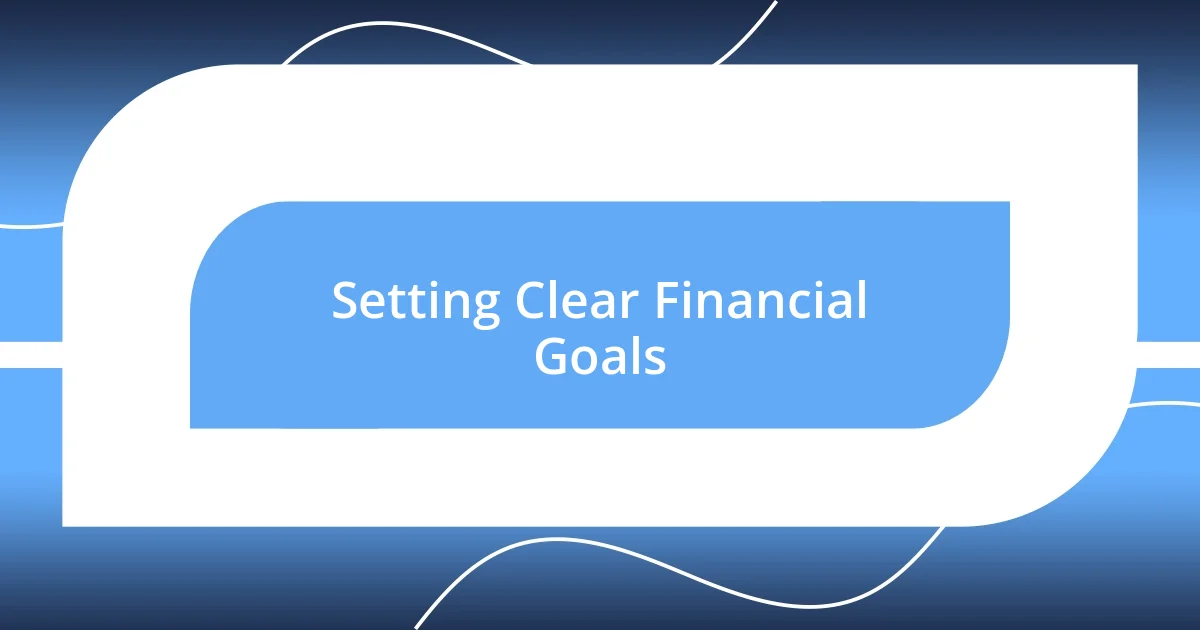
Setting Clear Financial Goals
Setting clear financial goals is crucial to maintaining a focused approach to my finances. I typically start by defining both short-term and long-term goals. For instance, planning for a vacation within the next year feels tangible and exciting. On the other hand, saving for a home is a longer journey; breaking it into smaller, actionable steps helps to keep the dream alive. Does that resonate with you? I think it’s about finding a balance between aspiration and practicality.
Sometimes, I use the SMART criteria—Specific, Measurable, Achievable, Relevant, Time-bound—to structure my goals. One example is when I aimed to save $5,000 for a summer trip in a year. I calculated that I needed to set aside about $420 a month. This clarity made it manageable. Have you ever used an approach like this? I believe it provides a roadmap, making the path toward achieving financial goals much clearer and less daunting.
Additionally, I’ve learned to revisit and revise my goals regularly. Life changes and so do priorities. A few months ago, I changed my focus from a big trip to building an emergency fund as unexpected expenses popped up. This shift not only kept me secure, but it also motivated me to keep saving when I saw my fund grow. How about you? Are you flexible with your financial goals, or do you feel tied down to your original plans?
| Financial Goal Type | Description |
|---|---|
| Short-term Goals | These are achievable within a year, like saving for a vacation or paying off a credit card. |
| Long-term Goals | These take several years, such as purchasing a home or preparing for retirement. |
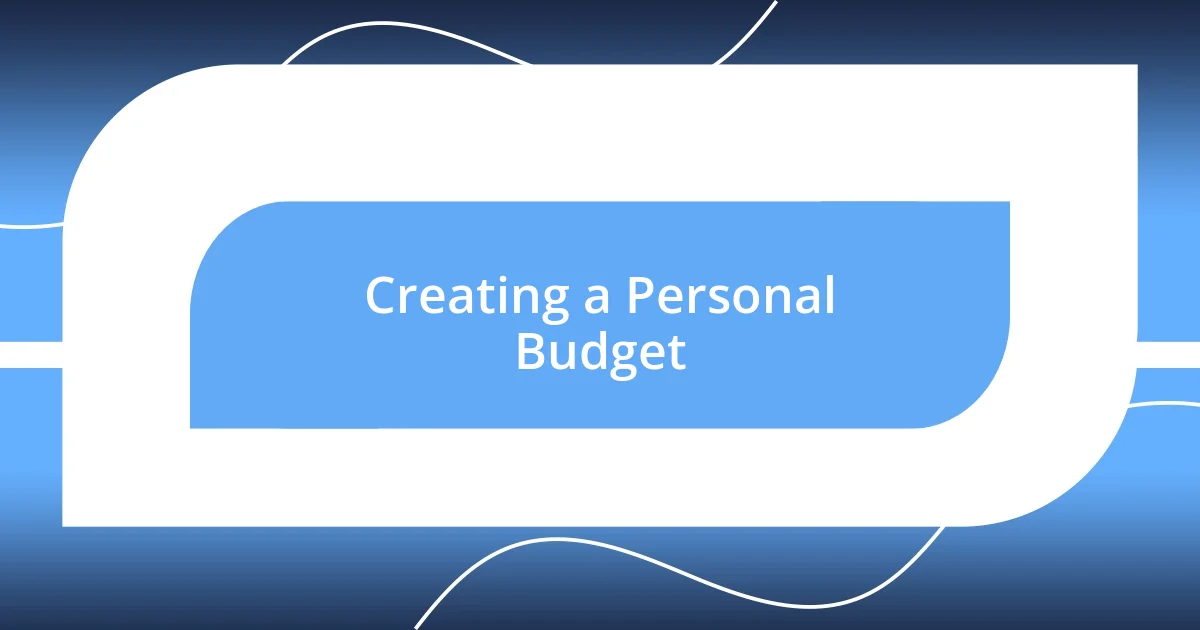
Creating a Personal Budget
Creating a personal budget truly changed my financial outlook. One evening, as I sat at my kitchen table with scattered receipts and bills, I had an epiphany: a budget isn’t just a set of numbers, but a tool for freedom. The first step I took was listing all my income sources and fixed expenses. This practice allowed me to see what I was working with, making it much easier to allocate funds for savings and discretionary spending.
Here’s a simple approach I followed to develop my budget:
- Identify Income: List all sources of income—salary, side gigs, and investments.
- Track Fixed Expenses: Document recurring payments like rent, utilities, and subscriptions.
- Categorize Variable Expenses: Break down expenses such as groceries, transportation, and entertainment.
- Set Savings Goals: Determine how much you want to save each month.
- Review Monthly: Check your budget against actual spending to adjust when necessary.
The emotional relief I felt after creating that budget was incredible. It felt like finally receiving the clarity I desperately needed, and this practice continues to guide me. By having a clear plan, I became more intentional with my spending. And when unexpected expenses cropped up, I felt confident tackling them because I knew exactly where I could cut back. Have you ever experienced that satisfaction of harmony in your financial life? It’s truly liberating.
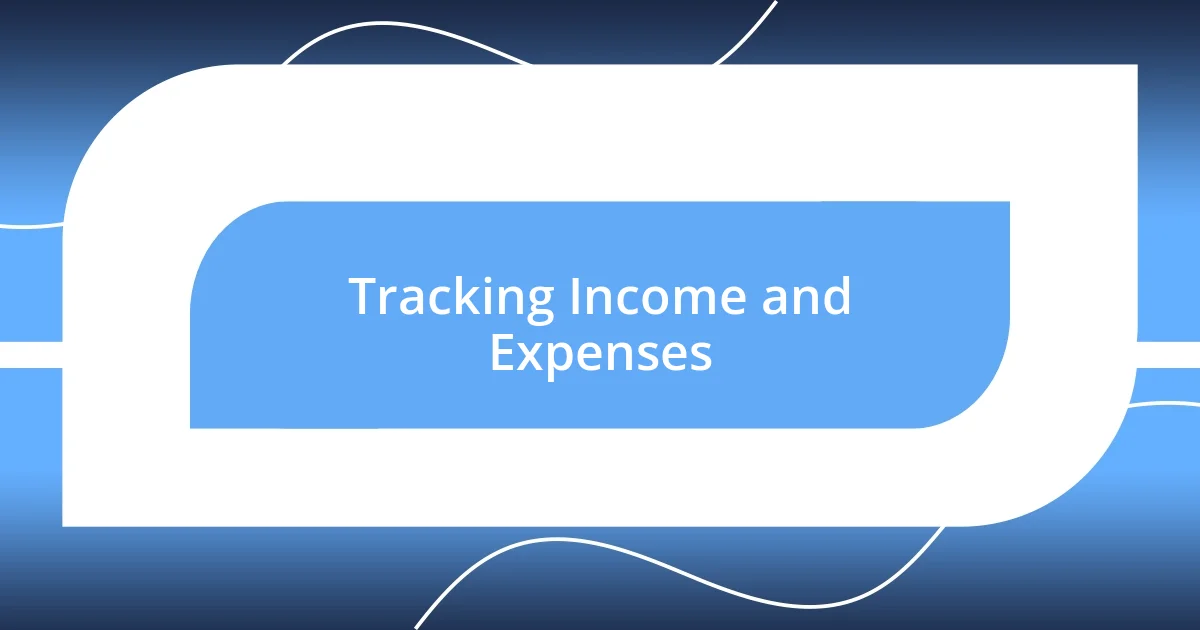
Tracking Income and Expenses
Tracking income and expenses is like having a financial diary—it brings everything into sharp focus. I used to let receipts pile up, thinking I’d sort them out eventually. It wasn’t until I started logging my income and expenses daily that I realized how much I could learn about my spending habits. Seeing those numbers laid out clearly helps me understand where my money truly goes. Have you ever had that “aha” moment when reviewing your finances?
One tool I find incredibly helpful is using apps for tracking. Initially, I tried keeping everything on paper, but it felt cumbersome, and I often missed entries. Now, I use a budgeting app that sends me reminders and visualizes my financial health. For example, last month, I noticed I was overspending on dining out. That awareness prompted me to challenge myself to cook more at home. It’s amazing how small adjustments can shift your financial landscape!
I also set aside time each week to review my spending. It’s become a ritual, almost therapeutic. I pull up my app, reflect on my expenses, and celebrate small wins, like sticking to my grocery budget. It’s like a mini celebration every week! Have you ever thought about how a dedicated time for financial reflection could change your perspective? I believe it adds accountability and empowers me to stay on track with my financial goals.
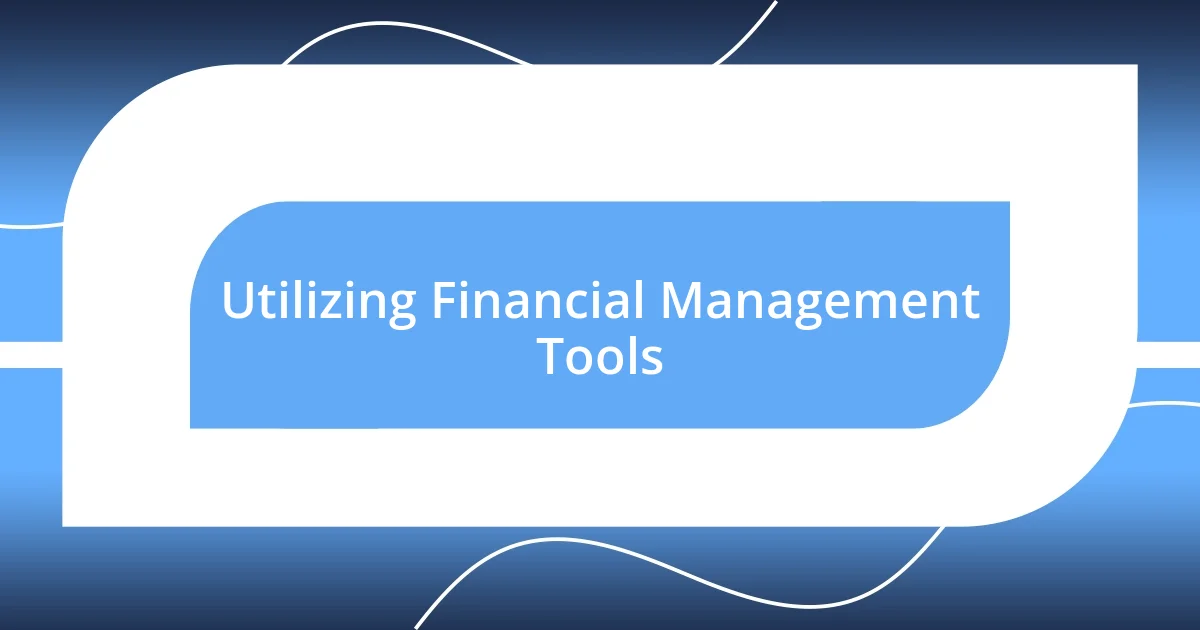
Utilizing Financial Management Tools
Utilizing financial management tools can feel like discovering a secret weapon in the quest for financial clarity. I remember the first time I explored a budgeting app— it was like flipping on a light switch in a dark room. Suddenly, I could see my spending behavior, and the various categories neatly organized made it clear where I could trim the fat. Have you ever felt the weight lift when you finally understand your finances? That’s the experience I had, and it was both enlightening and empowering.
One feature that I genuinely cherish in these tools is the ability to set up alerts for bill payments and budget limits. I recall one month when I was about to exceed my entertainment budget, and my app pinged me just in time. It felt like a little nudge from a wise friend, encouraging me to rethink my plans. By using reminders, I rarely miss a payment, which saves me from late fees and stress. Isn’t it refreshing to have technology do some of the heavy lifting for us?
Additionally, I’ve found that some tools allow for insightful reports and analytics. After a few months of usage, I could see trends, like my tendency to spend freely during the weekends. This revelation was quite eye-opening; I realized that my weekend habits needed a little tweaking. It’s fascinating how an app can reveal not just numbers but the underlying story of our spending. Have you considered how financial management tools could be your guide in uncovering your spending patterns? Trust me, having that information at your fingertips can transform your financial strategy entirely.
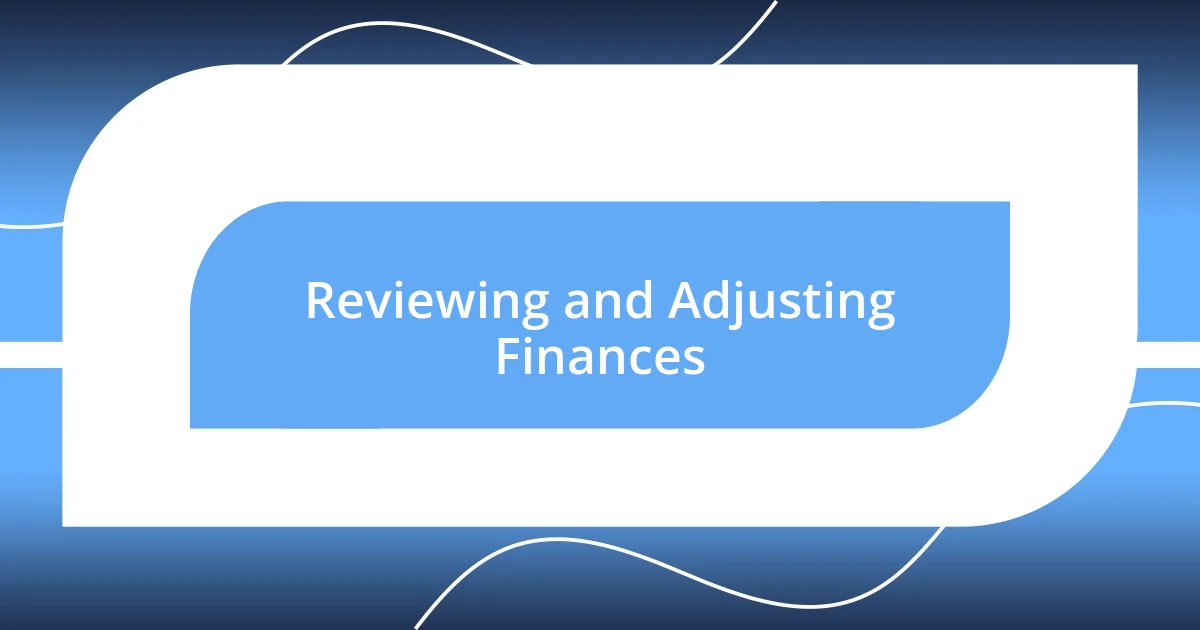
Reviewing and Adjusting Finances
When it comes to reviewing and adjusting my finances, I’ve learned that it’s not just about crunching numbers; it’s about reflection. At the end of each month, I pull up my spending report, and it feels like sitting across from a mentor who’s guiding me. I sometimes feel frustration looking at impulsive purchases, but I also find pride in recognizing where I’ve made substantial progress. Have you felt that mix of emotions when facing your financial realities?
Adjusting my budget is like shifting pieces on a game board. I remember once realizing that my original entertainment budget was way off base—it was too high for my lifestyle and financial goals. By recalibrating it after my monthly review, I created the space needed to save more for future adventures. That was such a rewarding decision! Have you ever had to make a tough choice in your budget, and how did it feel afterward?
Staying flexible is key, too. Life throws curveballs, and I’ve learned to adapt my financial approach as needed. Last year, a sudden car repair threw off my meticulously crafted budget for that month. Instead of panicking, I took a moment to reassess my priorities and shuffle funds around. It taught me the importance of resilience and adaptability. Do you think being open to change has made managing your finances easier? I truly believe it’s about keeping a steady course while allowing room for those unexpected bumps along the way.
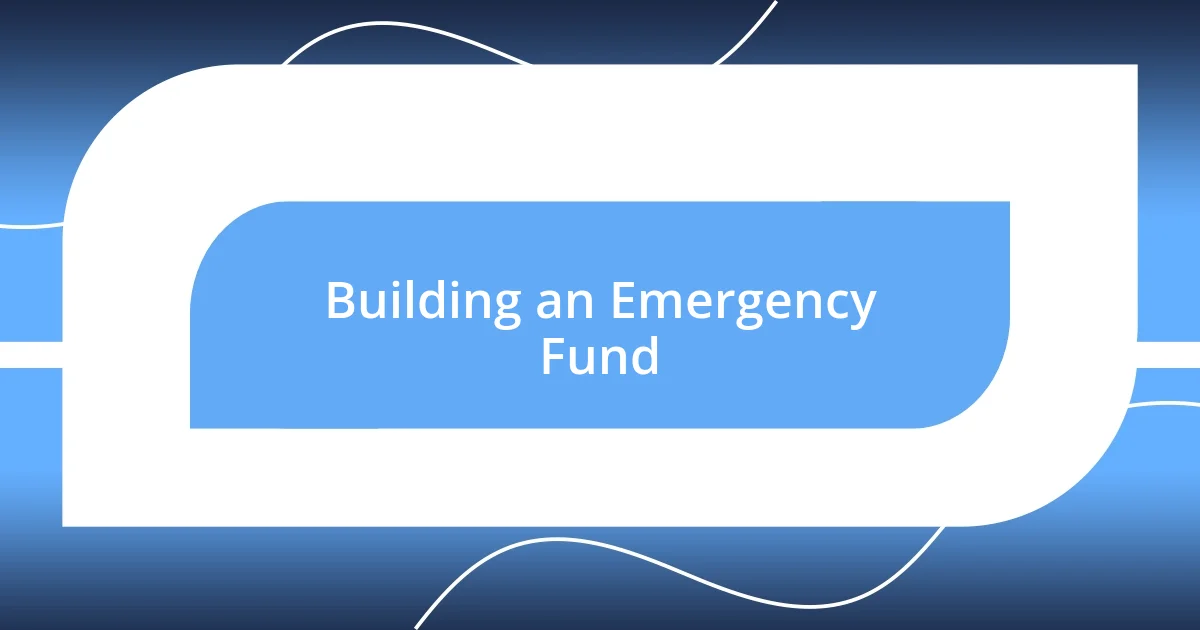
Building an Emergency Fund
Building an emergency fund is one of those financial principles that, while straightforward, carries a profound impact on one’s peace of mind. I distinctly remember my first attempt at setting aside money for emergencies; it felt a bit like staring at a mountain I wasn’t sure I could climb. Yet, as I began contributing just a small amount each month, that daunting peak slowly turned into a comfortable trail. Have you ever found a daunting task becomes manageable when broken down into smaller steps?
One breakthrough moment for me was when I realized the power of automating my savings. I set up my bank account to transfer a predetermined amount directly into a specific savings account right after payday. It was as if I had designed a little force field around my money—one that made it less accessible for impulsive spending and more available for peace of mind. How liberating is it to know that you’re building a safety net without even having to think about it?
I often reflect on the confidence an emergency fund brings, especially during uncertain times. When the pandemic hit, I was grateful for the choice I had made to prioritize savings; it acted like a financial life raft. Have you ever felt that sense of security in knowing you have a buffer in place? These small sacrifices, like giving up that daily coffee run, seemed trivial when I thought of my future self resting easy amid life’s unpredictability.












